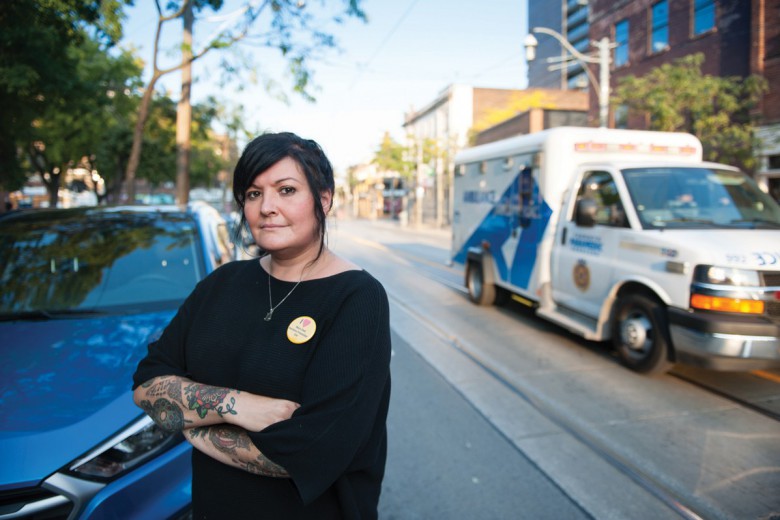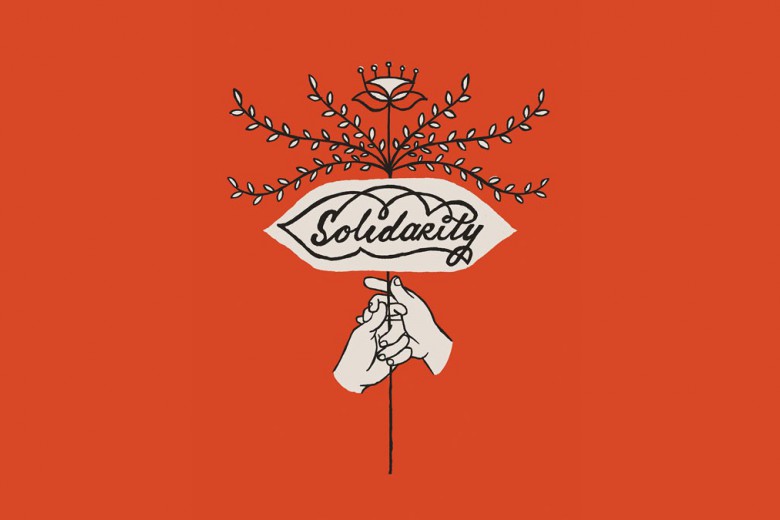My foray into labour organizing for sex workers began in 2002 when the co-founder of the International Union of Sex Workers (IUSW) visited the outreach project I worked with in London, U.K. The IUSW was looking for support to mobilize members for the U.K.’s first sex workers’ union. I was pumped! The energy around the table on voting day was palpable. People who worked on the street, in porn, in brothels, sex phone businesses, strip clubs, and other parts of the industry voted in the first sex workers’ local of the U.K.’s third-largest union, the GMB. Despite this very important recognition of sex workers’ right to self-organize and to join a trade union, it was unfortunately a symbolic gesture at best. Although the GMB would later help registered sex work businesses like strip clubs negotiate labour conditions, they were unable to provide avenues to address labour abuses for the great majority of sex workers who laboured under sex work criminalization in the U.K. Since at least the early 2000s, many unions across the globe, in addition to the GMB, have vocalized their support for sex workers, but these statements have not improved actual working conditions in criminalized sex industries.
Over the past few decades in Canada, sex work has been a hot topic at union conventions and union local meetings. Some unions have even passed resolutions to support legal reform that would allow for the protection of sex workers’ human rights, including employment and labour rights. But labour organizations and unions have failed to step up to help dismantle the legal barriers that make it impossible for people who sell sexual services to legally access employment and labour protections.
Criminalization of sex work
Under Canadian law, sex work is a crime. In December 2014, the purchase, advertising, and procuring of sexual services were all made criminal offences under the Protection of Communities and Exploited Persons Act (PCEPA) née Bill C-36. Some limited forms of sex work, such as stripping, pornography, and certain erotic massage work may function within registered businesses regulated under provincial and municipal laws, and in these contexts workers could theoretically attempt to access employment and labour standards. However, for most sex workers, accessing such protections is legally impossible as long as their labour activities and relationships constitute criminal offences. Under PCEPA, sex workers and third parties work in a context of illegality and the surveillance and punitive framework that comes with it. Because the sale of sexual services and majority of third-party roles in the sex industry are illegal, exchanges and negotiations between employees and employers are criminalized, and sex workers cannot seek entitlements or redress through provincial or federal employment and labour protections, which are essential mechanisms for advancing workers’ rights in any industry. The illegality of sex work requires third-party owners, managers, and other workers to avoid police and immigration detection at all costs. Incentives to improve working conditions don’t exist and labour exploitation is able to flourish in a criminalized environment: sex workers have little to no legal leverage and negotiating power, and they are unlikely to report incidents of violence, discrimination, harassment, or unsafe and unfair working conditions. Additionally, the harms that arise from sex work–specific criminal offences are intensified by other punitive regulations, like those in the Immigration and Refugee Protection Regulations that prohibit migrant sex work, as well as municipal bylaws that dictate working conditions in massage parlours and those regulating public spaces and the movement of the often Indigenous, Black, and racialized sex workers who occupy them. This criminalization exacerbates poor working conditions and limits the capacity of sex workers to improve them.
Sex workers cannot access formal mechanisms to uphold employment protections, collectively bargain, or otherwise improve working conditions as long as sex work remains illegal and its poor working conditions are not recognized as labour issues. When sex work itself is enshrined in legislation and social discourse as exploitation, all working conditions (even good ones) are seen as exploitative. Criminalization prevents access to employment and labour standards and unionization – it prevents sex workers from establishing legal and explicit contracts with employers, from collectively negotiating with third parties, and generating collective representation. This requires the decriminalization of sex work – that is the removal of all criminal and punitive laws specific to sex work.
Trying to build political power
Like many, I came into sex workers’ rights activism with very high hopes for the ways that labour frameworks, movements and organizations could help sex workers, despite the barrier of criminalization. But over the 50 years since the sex worker rights movement established the recognition of “sex work as work” as one of its many demands, Canadian labour organizations and unions have not moved beyond basic messages of support and affirmation.
When I returned to Canada in 2004 after working in the U.K., I tried to start a Canadian branch of the IUSW to see how labour organizing could improve working conditions for sex workers in Canada. With a group of sex workers, I worked to mobilize local workers and researched dental and health insurance companies and other labour benefits. Our group also approached the Montreal Conseil Central at the Con fédération des syndicats nationaux (CSN) to create a branch for sex workers and to build political support to fight for the recognition of sex work. We were told that benefits for communities considered “risky,” like sex workers, were untenable and were rejected by the CSN, which was wedded to the view of sex work itself as a form of exploitation – something put into writing years later and since used to shut sex workers out of advocacy efforts to improve living and working conditions.
Parallel to this effort, in 2003, sex worker rights advocate and mentor Kara Gillies and I launched a collective called the Canadian Guild for Erotic Labour. Part of this work continued on from Gillies’ efforts in Toronto to support migrant sex workers to negotiate better working conditions. With the Guild, we also advocated for unions to take visible and strong positions to end the criminalization of sex work, in the hopes that sex workers could one day have legal access to employment and labour rights. We recognized that unions in Canada were in a powerful place to shift public policy. Much of our efforts included attempting to move the Canadian Union of Public Employees (CUPE), the country’s largest union, forward on their 2001 call to members to pass a resolution to support the decriminalization of sex work. While divisions such as CUPE Ontario have demonstrated support for sex workers’ labour rights, such as when staff at Maggie’s Toronto Sex Workers Action Project unionized in 2021, the larger CUPE National organization remains unpositioned and absent from sex work advocacy to this day.
Despite the barriers criminalization poses to formal labour organizing, sex workers navigate, resist, and mitigate exploitative working conditions without the support of employment protections, labour boards, and other institutions – they’re creative in finding ways to address exploitation. Part of this includes the creation of sex worker collectives and self-directed organizations with the aim of improving working conditions, accessing employment protections, or unionizing. This allows for workers to envision labour standards, research patterns of exploitation in the industry and attempt to alter the ways that exploitative labour conditions manifest.
Navigating this organizing without the institutional support available to many other workers is exhausting for sex workers and makes organizing efforts easy to abandon in favour of simply finding less exploitative bosses or locations with better working conditions, where possible. Should sex workers collectively organize in sex work spaces, too many workers risk drawing the attention of law enforcement. This has consequences for increased surveillance and detection, and can result in losing children, homes, and income or being detained and deported, because their activities and relationships are illegal – not to mention the risk of arrest for third parties, which include those who are sex workers.
Bedford v. Canada – the first Canadian constitutional challenge to sex work laws, brought forward by Terri-Jean Bedford, Amy Lebovitch, and Valerie Scott struck down three major sex work-specific offences and was a catalyst to many unions writing resolutions. The years that followed the 2013 Supreme Court decision were filled with a flurry of resolutions passed in unions across the country, thanks to the tireless work of so many sex worker activists. Countless unions and union locals made calls for the decriminalization of sex work, attended or organized activities on International Day to End Violence against Sex Workers (December 17), and passed resolutions in support of sex workers’ rights. These include the Provincial Women’s Committee at Ontario Public Service Employees Union (2014), Syndicat des travailleuses et travailleurs en intervention communautaire (STTIC, 2016), MoveUP (2019), and Canadian Office and Professional Employees Union-Syndicat professionnel du Québec (2022). Still silent and absent from public support are major labour organizations like CUPE National, as mentioned, and the Canadian Labour Congress.
Beyond resolutions
But why do unions stop at resolutions and solidarity days? Unions need to meaningfully partake in the labour of sex work law reform. This means engaging with law and policy-makers and the courts, and unions have failed colossally on this level.
After the 2013 Bedford v. Canada Supreme Court of Canada (SCC) decision, there were countless opportunities for unions to take more active roles in the struggle for improved working conditions for sex workers. Between the SCC decision and the introduction of Bill C-36 in June 2014, there were multiple lobbying efforts and meetings with MPs. In June 2014, when the Conservative government introduced Bill C-36, there were extensive government consultations and parliamentary committee hearings that provided key opportunities for migrant, Indigenous, 2SLGBTQ+, women’s organizations, and other rights groups to get more deeply involved in the fight for decriminalization. Where were Canada’s labour organizations and unions during these times?
Since 2014, sex workers’ rights groups have spent countless hours advocating, lobbying, and educating members of Parliament and other policy-makers. Special committees were formed to study the PCEPA, and conversations about coercion and trafficking occupied parliamentary committee discussion and studies. Sex workers and our allies submitted briefs and made presentations to parliamentarians about the violence and labour exploitation that sex workers experience in a context of criminalization, immigration provisions that target migrant sex work, and exclusion from employment and labour protections. No labour organizations or unions submitted parliamentary briefs to lay out how decriminalization could forge a path to employment and labour protections, including occupational health and safety and employment standards.
In 2021, 25 sex workers’ rights groups, under the banner of the Canadian Alliance for Sex Work Law Reform, launched a constitutional challenge to the majority of the sex work specific criminal offences. Many rights groups – including the Migrant Workers Alliance for Change – intervened in the case. However, no other labour organization or union intervened or contacted us at the Alliance for Sex Work Law Reform to inquire about the ways they could use their power to engage lawmakers.
Despite some resolutions to support sex workers’ rights, most labour organizations and unions are still hesitant to be on the front lines with us. Part of this might be because some are rooted in antiquated ideas about sex work and sex workers: they continue to refuse to recognize sex work as labour rather than a “social” issue. They are trapped within prohibitionist anti–sex work rhetoric that frames sex work itself as exploitation and sex workers as victims rather than workers, and they lack organizational and political cohesion around sex workers’ rights. Some organizations and unions that have passed resolutions to “support sex workers’ rights” may also still not grasp that sex workers need help achieving the decriminalization of their labour activities and relationships in order for those resolutions to be realized.
A call to unions
There are numerous ways that unions and organizations can join sex workers on the front lines to be involved in the fight for law and policy reform that would pave the way for sex workers to gain access to mechanisms to address exploitative working conditions. Unions and labour organizations are exceptionally well placed for this – organized labour in Canada has a solid history of advancing a social justice agenda and supporting the rights of communities and individuals facing multiple inequalities and oppressions. They occupy and can share their privileged seats at the tables of politicians and policy-makers, along with influencing discourse around labour and employment issues across the country. They have institutional power and more resources than sex workers, and they can organize at the intersections of our communities to help create solidarities between sex workers and other workers who so often dismiss sex work as exploitation.
Labour organizations can make the connections and create opportunities for sex workers to connect with other workers, voicing how intersections of race, gender, disability, immigration status, and class impact labour conditions for the most marginalized of workers, including sex workers. This can build stronger movements and get us closer to our goals, faster.
Additionally, labour organizations and unions can in formally support sex workers with organizing and lobbying, including with financial and other resources.
None of us can wait for decriminalization to happen to continue our organizing for institutional change and respect for sex workers’ rights. The fight for decriminalization is only one step toward realizing sex workers’ rights – removing punitive sex work laws will not resolve the systemic barriers, racism, colonialism, and impacts of other laws that target sex workers and members of our community. Decriminalization of sex work is not the end goal for sex workers’ rights, but rather the beginning. We won’t get there with resolutions and words of solidarity, but as we edge closer to equal treatment, we need labour organizations and unions to exercise more solidarity by engaging law and policy-makers to change the legislation that prevents the legal recognition of sex work as labour.







